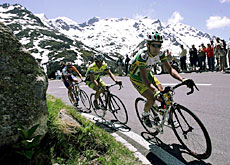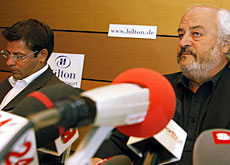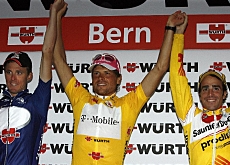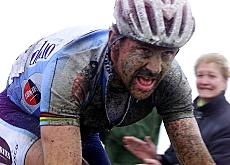Tour de Suisse saddled with doping fallout

Organisers of this year's Tour de Suisse, which started on Saturday, are refusing to let the cycling race be overshadowed by a series of recent doping scandals in the sport.
They are confident that Switzerland’s largest cycling competition will attract the crowds despite the absence of the tour winners of 2005 and 2006.
The race, over 1,252 kilometres and over nine stages, will end in the Swiss capital, Bern, on June 24. It is traditionally seen as the final warm-up for cycling’s most prestigious event, the Tour de France.
The route of the 2007 Tour de Suisse includes for difficult stages in the Alps. They are expected to be decisive because some of them end with mountain-top finishes.
Previous winners Jan Ullrich from Germany and Spain’s Aitor González will not be taking part in the opening time-trial in Olten having both been involved in doping allegations.
Ullrich – also a former Tour de France champion – was implicated in a Spanish blood doping investigation in Spain and retired from the sport in February.
González, who won the Swiss race in 2005, is still under a two-year ban after testing positive for steroids.
They are among a series of riders drawn into doping scandals, including Floyd Landis and Ivan Basso as well as members of the German Telekom team.
Chemical help
Tour director Armin Meier, is convinced that fans will not be put off by the doping scandals and that as usual there will be a great party atmosphere along the byways of the tour.
“The Tour de Suisse will also this time be a real success with the public,” he said.
Meier says the cyclists will survive the nine-day race – which includes three mountain stages – without any chemical help.
But he has doubts as to whether it is possible to win the notoriously tough Tour de France without resorting to doping. He is therefore calling for the three-week race to be made shorter as he maintains that the physical and mental demands are too high.
Meier is no stranger to the cycling world. A former professional cyclist, he was part of the 1998 Festina team that was excluded from the Tour de France over doping allegations.
Meier, along with Alex Zülle and Laurent Dufaux, was one of those to admit to the offence.
No favourites
As for this year’s Tour de Suisse, there are no clear favourites. But Andreas Klöden, Michael Rogers, Carlos Sastre, Fränk Schleck, Yaroslav Popovych and Damiano Cunego are all hot favourites for the overall victory.
Swiss racers are not considered contenders this year. But like many others of the more than 160 riders they will use the tour in the Swiss Alps as a build-up for July’s Tour de France.
Time trial world champion Fabian Cancellara is hoping for double success in the individual time trials on the opening and finishing days.
Others, such as Martin Elmiger, Michael Albasini and Gregory Rast, are also determined to win stages.
swissinfo, based on a German article by Renat Künzi
The race starts in Olten on June 16 and ends in Bern on June 24. Total distance: 1,252km.
It has nine stages and includes six mountain passes: Flüela, Lukmanier, Nufenen, Furka, Grimsel and Susten.
Three stages end with mountain-top finishes: Malbun (stage 4), Crans-Montana (stage 6), Grimsel (stage 7).
The Swiss number one is Fabian Cancellara, time trial world champion.
Cycling, along with athletics and cross-country skiing, is among the sports most affected by doping.
Experts say the main problems are that it mainly only comes to light years after it has taken place and that anti-doping bodies are not well funded.
The most common forms of doping are: Epo – a performance-enhancing substance used to increase oxygen carrying capacity.
Blood doping: administration of red blood cells to a competitor to increase their blood’s oxygen-carrying capacity.
Growth hormones: regulates metabolic processes, builds up muscles (Epo has opposite effect).
Insulin: regulates blood sugar (helps performance), helps muscle growth.
Testosterone: steroid hormone – builds up muscles and stamina.

In compliance with the JTI standards
More: SWI swissinfo.ch certified by the Journalism Trust Initiative



You can find an overview of ongoing debates with our journalists here. Please join us!
If you want to start a conversation about a topic raised in this article or want to report factual errors, email us at english@swissinfo.ch.